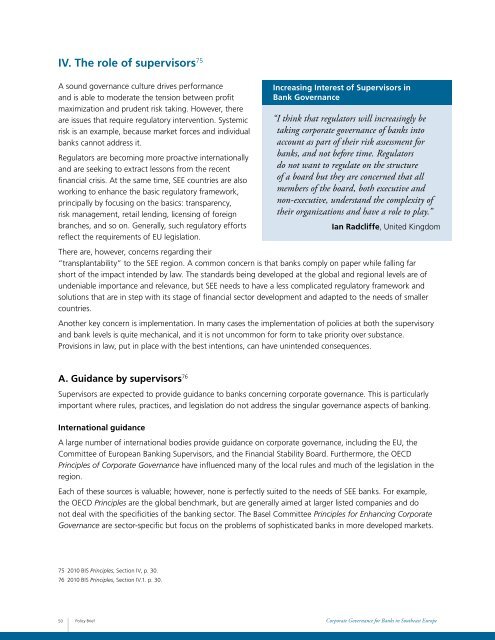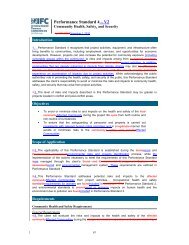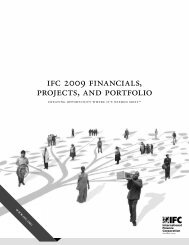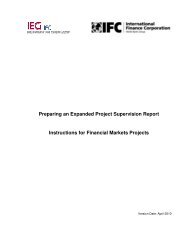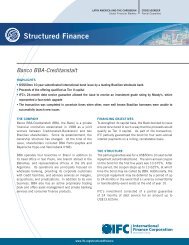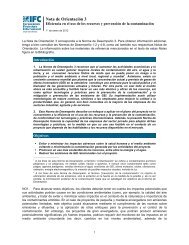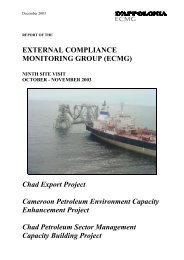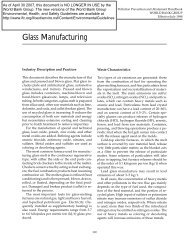Corporate Governance for Banks in Southeast Europe: Policy - IFC
Corporate Governance for Banks in Southeast Europe: Policy - IFC
Corporate Governance for Banks in Southeast Europe: Policy - IFC
Create successful ePaper yourself
Turn your PDF publications into a flip-book with our unique Google optimized e-Paper software.
IV. The role of supervisors 75<br />
A sound governance culture drives per<strong>for</strong>mance<br />
and is able to moderate the tension between profit<br />
maximization and prudent risk tak<strong>in</strong>g. However, there<br />
are issues that require regulatory <strong>in</strong>tervention. Systemic<br />
risk is an example, because market <strong>for</strong>ces and <strong>in</strong>dividual<br />
banks cannot address it.<br />
Regulators are becom<strong>in</strong>g more proactive <strong>in</strong>ternationally<br />
and are seek<strong>in</strong>g to extract lessons from the recent<br />
f<strong>in</strong>ancial crisis. At the same time, SEE countries are also<br />
work<strong>in</strong>g to enhance the basic regulatory framework,<br />
pr<strong>in</strong>cipally by focus<strong>in</strong>g on the basics: transparency,<br />
risk management, retail lend<strong>in</strong>g, licens<strong>in</strong>g of <strong>for</strong>eign<br />
branches, and so on. Generally, such regulatory ef<strong>for</strong>ts<br />
reflect the requirements of EU legislation.<br />
Increas<strong>in</strong>g Interest of Supervisors <strong>in</strong><br />
Bank <strong>Governance</strong><br />
“I th<strong>in</strong>k that regulators will <strong>in</strong>creas<strong>in</strong>gly be<br />
tak<strong>in</strong>g corporate governance of banks <strong>in</strong>to<br />
account as part of their risk assessment <strong>for</strong><br />
banks, and not be<strong>for</strong>e time. Regulators<br />
do not want to regulate on the structure<br />
of a board but they are concerned that all<br />
members of the board, both executive and<br />
non-executive, understand the complexity of<br />
their organizations and have a role to play.”<br />
Ian Radcliffe, United K<strong>in</strong>gdom<br />
There are, however, concerns regard<strong>in</strong>g their<br />
“transplantability” to the SEE region. A common concern is that banks comply on paper while fall<strong>in</strong>g far<br />
short of the impact <strong>in</strong>tended by law. The standards be<strong>in</strong>g developed at the global and regional levels are of<br />
undeniable importance and relevance, but SEE needs to have a less complicated regulatory framework and<br />
solutions that are <strong>in</strong> step with its stage of f<strong>in</strong>ancial sector development and adapted to the needs of smaller<br />
countries.<br />
Another key concern is implementation. In many cases the implementation of policies at both the supervisory<br />
and bank levels is quite mechanical, and it is not uncommon <strong>for</strong> <strong>for</strong>m to take priority over substance.<br />
Provisions <strong>in</strong> law, put <strong>in</strong> place with the best <strong>in</strong>tentions, can have un<strong>in</strong>tended consequences.<br />
A. Guidance by supervisors 76<br />
Supervisors are expected to provide guidance to banks concern<strong>in</strong>g corporate governance. This is particularly<br />
important where rules, practices, and legislation do not address the s<strong>in</strong>gular governance aspects of bank<strong>in</strong>g.<br />
International guidance<br />
A large number of <strong>in</strong>ternational bodies provide guidance on corporate governance, <strong>in</strong>clud<strong>in</strong>g the EU, the<br />
Committee of <strong>Europe</strong>an Bank<strong>in</strong>g Supervisors, and the F<strong>in</strong>ancial Stability Board. Furthermore, the OECD<br />
Pr<strong>in</strong>ciples of <strong>Corporate</strong> <strong>Governance</strong> have <strong>in</strong>fluenced many of the local rules and much of the legislation <strong>in</strong> the<br />
region.<br />
Each of these sources is valuable; however, none is perfectly suited to the needs of SEE banks. For example,<br />
the OECD Pr<strong>in</strong>ciples are the global benchmark, but are generally aimed at larger listed companies and do<br />
not deal with the specificities of the bank<strong>in</strong>g sector. The Basel Committee Pr<strong>in</strong>ciples <strong>for</strong> Enhanc<strong>in</strong>g <strong>Corporate</strong><br />
<strong>Governance</strong> are sector-specific but focus on the problems of sophisticated banks <strong>in</strong> more developed markets.<br />
75 2010 BIS Pr<strong>in</strong>ciples, Section IV, p. 30.<br />
76 2010 BIS Pr<strong>in</strong>ciples, Section IV.1. p. 30.<br />
50<br />
<strong>Policy</strong> Brief<br />
<strong>Corporate</strong> <strong>Governance</strong> <strong>for</strong> <strong>Banks</strong> <strong>in</strong> <strong>Southeast</strong> <strong>Europe</strong>


